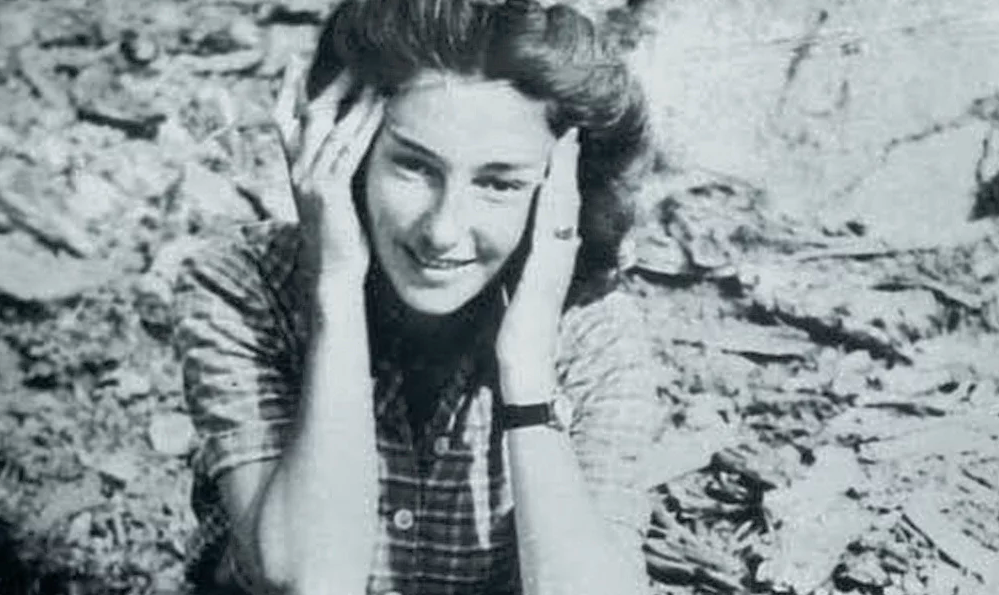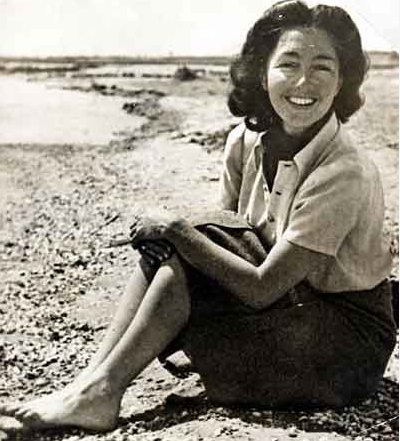Maria Krystyna Janina Skarbek worked for the British Special Operations Executive (SOE) from Poland during World War II. Due to her daring exploits during the war on warfare missions in Poland and France, both of which were occupied by the Nazis, many came to know and celebrate her. Skarbek was also one of the SOE’s longest serving female agents during wartime. She began to use the name Christina Granville in 1941, which she eventually took one when she became a British citizen in 1946.

On May 1, 1908, Maria Krystyna Janina Skarbek was born in Warsaw, Poland to Count Jerzy Skarbek and Stefania Goldfeder Skarbek. Her father was a Roman Catholic and her mother came from a Jewish family. Jerzy lived a very lavish lifestyle, and when he married his wife, used her dowry to pay debts. Krystyna was their second child after Andrezej (Andrew). While he was more like his mother and her side of the family, Krystyna was like her father and enjoyed horseback riding. The family often visited Zakopane, a town in southern Poland, where she became very skilled at skiing.
Krystyna Skarbek married Gustaw Gettlich, a young businessman, in Warsaw on April 21, 1930. Their marriage did not work out and soon came to an end. Skarbek soon got involved in a love affair, but was unable to marry him because his mother refused to allow a divorcée with no money to marry her son.
Skarbek was back in Zakopane skiing when she lost control one day. A giant man, Jerzy Giżycki, stepped into her path and stopped her, saving her. He came from a wealthy family, but ran away to the United States as a tteenager. The two got married on November 2, 1938 in Warsaw. Soon after, he was given a position as a diplomate in Ethiopia and was Poland’s consul general until Germany invaded Poland in September of 1939.
When World War II broke out, Skarbek and her husband left Poland and sailed to London. There, Skarbek began seeking out a position to provide her services against the enemy, the Nazis. At first, authorities in Britain were not interested. Though eventually, journalist Frederick Augustus Voigt and other acquaintances of her were able to convince them. Voigt was the one to introduce her to the SIS, or Secret Intelligence Service.
In December of 1939, Skarbek left London for Hungary and was able to persuade Jan Marusarz, Olympic skier from Poland, to escort her from the Tatra Mountains, which were covered in Snow, to where Poland was occupied the Nazis. There, she went to Warsaw to persuade her mother to leave Poland, but her mother refused. Soon, Skarbek’s mother, Stefania, died in prison in Warsaw.
There were many dangers of working back home in Warsaw for SOE. At one such instance, she was at a café most likely in early 1940 when a woman who knew her started calling out her name. Skarbek had to deny that was her name, though the lady swore it was her. To not raise any suspicion, Skarbek had to be especially careful and not leave right after the woman had.
Once back in Hungary, Skarbek met Andrzej Kowerski, an officer in the Polish army. The two had actually met as children briefly. He had lost part of his leg previously and was then gathering intelligence for Poland. In January of 1941, the Nazi secret police, the Gestapo, arrested the two. By pretending to have tuberculosis by biting her lip until it began to bleed, Karbek was able to get their release. Through Turkey and the Balkans, they escaped Hungary.

Skarbek also played a part in organizing a system of couriers from Poland to gather intelligence and bring their reports back to Warsaw and Budapest. When Kowerski’s cousin smuggled a unique anti-tank rifle, Skarbek was able to conceal it in Budapest in her apartment, but was never able to use it. Her and Kowerski also organized for the railroads, roads, and river traffic on the Romanian and German borders to be watched. Skarbek is given the credit for sabotaging communications on the River Dubane. On top of that, she was able to provide vital intelligence information of oil from Romania’s oilfields being transported to Germany.
Eventually, Skarbek left Europe and arrived in Cairo at the SOE offices. They soon learned that they were under suspicion. This was because Skarbek had contacts with the “Musketeers”, an intelligence organization in Poland. Not only that, but she was also under suspicion because she was so easily able to get her hands on transit visas. Others had their suspicions of Kowerski as well. General Colin Gubbins addressed this from London in a letter. He was soon able to resume working as an intelligence officer. Skarbek soon visited headquarters for the Polish military in British Women’s Auxiliary Air Force uniform and was given absolute respect, showing that they did not find her as suspicious as they had shortly before.
After gathering intelligence from the Musketeers,Skarbek had predicted that Germany would invade Russia. Sure enough, in June of 1941, Germany began Operation Barbarossa.
Her husband Jerzy Giżycki abruptly left his career as an intelligence agent when he found out about his wife and Kowerski. Skarbek informed him that she loved Kowerski, and her husband left to Canada and at one point, moved to Canada. It wasn’t until August 1, 1946 that they were officially divorced by Polish consulate in Berlin.
In 1944, there was a turn of events that very much changed Skarbek’s position. She was soon offered a spot on the SOE’s French teams and she took the name of Madame Pauline. As the war continued to rage on, the SOE was running out of operatives trained well enough to be able to apply to the demands after France had been invaded. Skarbek also had a good track record going for her of courier work in places in Europe occupied by the Nazis. All she needed for working in France was some extra work and guidance about what she would have to do in the country. Cecily Lefort, an SOE agent, had been a courier but was captured by the gestapo and tortured for information, eventually being killed. So, they needed someone to replace her, and they chose Skarbek to do so.
Her mission was launched from Algiers, Algeria where the AMF Section had its base. The AMF Section had recently been created after Operation Torch, which had started at the end of 1942. Soon after, nearly all of the SOE’s French Sections were united into the Forces Francaises de L’Interieur (FFI), combining with the Maquis. On July 6, 1944, “Madame Pauline Armand” was parachuted into the southeastern part of France. From there, Skarbek was a part of Franic Cammaert’s “Jockey” network. Ealry the next August, she spent two days hiking through the mountains in Poland then went on to persuade Polish conscripts that they could desert. She was able to convince the other German troops in the area to surrender as well.
When Skarbek learned that fellow SOE agent Xan Fielding and French officer Christian Sorensen were to be executed by the Gestapo, she met with Captain Albert Schneck. She pretended to be Bernard Montgomery’s, a British general, niece and threatened the captain if they harmed the officers and then offered two million francs for their release. Finally, she had been able to negotiate their release.
After her service in France, Skarbek was greatly praised. It restored her reputation politically and militarily. The SOE teams returned and most of the British women sought missions in the Pacific Theater of the war. But as a Pole, Skarbek was given the position as a courier for the SOE’s final missions in Poland. The Red Army, or the Soviet Armed Forces, advanced through Poland. Meanwhile, the British were working with the exiled Polish government to leave a network in place in Poland to report on the events of the new People’s Republic of Poland. In early 1945, Skarbek and Kowerski reunited and were about to be dropped into Poland. The mission, Operation Freston, ended up being cancelled because the first group to go into Poland was quickly captured by the Red Army, though soon released.
Skarbek and the other women in the SOE were given military ranks. Skarbek seemed to have been a member of both honorary commissions these women were given the choice of, the Women’s Transport Service or the Women’s Auxiliary Air Force.
The war soon came to an end and Skarbek was left to support herself with hardly any money and unable to return home to her native land. She became a naturalized British citizen in 1946, adopting the name of Christine Granville, which she had also used throughout the war.
On June 15, 1952, forty-four year old Krystyna Skarbek, now Christine Granville, was stabbed to death in London at the Shelbourne Hotel. Shortly before, she was a liner stewardess and had only been in the hotel for a day at that point. Her cousin had to identify her body. Dennis George Muldowney was her murdered, and she had previously rejected the advanced he had made on her. He was convicted of murdering her and was hanged on September 30, 1952. Skarbek was interred in London at St. Mary’s Roman Catholic Cemetery. Kowerski died from cancer in 1988 and his ashes were interred at the foot of her grave.